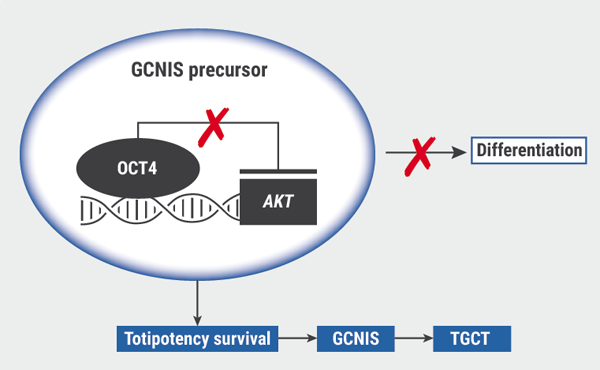Both activated androgen receptors and elevated androgen production promote prostate cancer; therefore, treatment is directed towards both blocking androgen receptors and suppressing androgen production. Apalutamide is an androgen receptor inhibitor and abiraterone acetate is an androgen inhibitor that works via ligand suppression. Abiraterone acetate is administered in combination with either prednisone or prednisolone. The ACIS trial (NCT02257736) hypothesised that additional benefit could be conferred by combining these therapies.
Dr Dana Rathkopf (Memorial Sloan Kettering Cancer Center, New York, USA) shared the results of the phase 3, randomised, double-blind ACIS trial designed to compare radiographic progression-free survival (rPFS) in mCRPC patients receiving apalutamide in addition to AAP with rPFS in mCRPC patients with receiving placebo plus AAP. None of the 982 patients in the study had been previously treated with chemotherapy.
The primary endpoint was investigator-assessed rPFS over a time frame defined as time from randomisation until death, loss to follow-up, withdrawal of consent, or end of study, whichever occurred first, up to 5 years. Progression of soft tissue lesions was defined according to the Response Evaluation Criteria in Solid Tumours (RECIST) v1.1. After a median follow-up of 25.7 months, the median rPFS in the apalutamide plus AAP group was 22.6 months, versus 16.6 months in the placebo plus AAP group (HR 0.69; 95% CI 0.58–0.83; P<0.0001). These results equated to an extension of rPFS of 6 months and a 31% reduction in risk of rPFS in chemotherapy-naïve mCRPC patients.
Secondary outcomes were overall survival, prostate-specific antigen (PSA) response, time to initiation of opioid use, time to initiation of chemotherapy, and time to pain progression (as measured by the Brief pain inventory-short form scale). The first interim analysis for overall survival also occurred after a median period of 25.7 months, and the apalutamide plus AAP treatment arm showed a longer median OS than the placebo plus AAP treatment arm, although not statistically significant. The apalutamide plus AAP group demonstrated a significantly higher rate of ≥50% decline in PSA compared with placebo plus AAP (RR 1.09; 95% CI 1.02–1.17; P=0.015). Time to PSA response, time to initiation of opioid use, time to initiation of chemotherapy, and time to pain progression did not differ significantly between the 2 treatment groups.
In terms of treatment-emergent adverse events, 310/490 (63.3%) participants in the apalutamide plus AAP group reported grade 3 to 4 adverse events, compared with 275/489 (56.2%) participants in the placebo plus AAP group. No new safety concerns were identified.
- Rathkopf D. Final results from ACIS, a randomised, placebo-controlled double-blind phase 3 study of apalutamide and abiraterone acetate plus prednisone (AAP) versus AAP in patients with chemo-naive metastatic castration-resistant prostate cancer (mCRPC). Abstract 9, ASCO Genitourinary Cancers Symposium, 11–13 February 2021.
Copyright ©2021 Medicom Medical Publishers
Posted on
Previous Article
« Dose-intensified radiation therapy fails to provide better outcomes in prostate cancer Next Article
Role of prostate cancer genomics is evolving »
« Dose-intensified radiation therapy fails to provide better outcomes in prostate cancer Next Article
Role of prostate cancer genomics is evolving »
Table of Contents: ASCO GU 2021
Featured articles
Prostate Cancer
Lu177 as a promising new therapy for metastatic prostate cancer
Role of prostate cancer genomics is evolving
Apalutamide prolongs progression-free survival in prostate cancer
Dose-intensified radiation therapy fails to provide better outcomes in prostate cancer
Intrinsic tumour biology may be predictive of treatment response in prostate cancer
Final TITAN trial results favour use of apalutamide
Penile Cancer
Prognosis of penile cancer associated with HPV status
Renal Cancer
Superior clinical outcomes and QoL with nivolumab plus cabozantinib in RCC
Lenvatinib plus pembrolizumab prolongs survival in renal cell carcinoma
Inflammatory markers may guide treatment decisions in metastatic renal cell cancer
Clinical trial exclusion criteria may lead to lack of evidence in real-world patients: how do the excluded fare?
Axitinib offers hope for improving renal cell cancer surgical outcomes
Cabozantinib as possible new first-line therapy in translocation renal cell carcinoma
Predictors of oral anti-cancer agent utilisation in renal cell carcinoma
Denosumab plus pembrolizumab in advanced clear cell renal cell carcinoma
Testicular Cancer
New prediction model for brain metastasis in germ cell tumours
Reduction in radiation exposure is possible in testicular seminoma surveillance
New therapeutic option for early metastatic seminoma
Urothelial Cancer
Poorer outcomes in bladder cancer predicted by race/ethnicity and gender
Enfortumab vedotin as a promising treatment option for bladder cancer: phase 3 results
Enfortumab vedotin as a promising treatment option for bladder cancer: phase 2 results
New standard of care recommended for patients with upper tract urothelial cancer
Signature DNA alterations in subtypes of bladder cancer
ACE inhibitors associated with superior responses in bladder cancer
Better allocation of research dollars needed
Better prediction of favourable responses to immune checkpoint inhibitors in mUC
Genitourinary Oncology
Researchers call for an overhaul of licensing and funding of anti-cancer drugs
Exploring a new strategy for metastatic germ cell tumours
Related Articles

August 24, 2020
Infertility and testis cancer risk: causal or association?

© 2024 Medicom Medical Publishers. All rights reserved. Terms and Conditions | Privacy Policy
HEAD OFFICE
Laarderhoogtweg 25
1101 EB Amsterdam
The Netherlands
T: +31 85 4012 560
E: publishers@medicom-publishers.com

